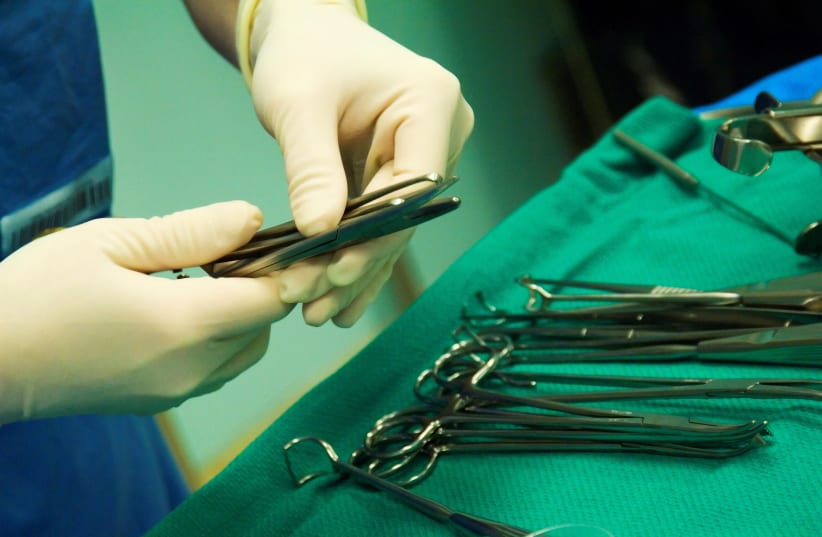The Islamic Republic of Iran’s corruption-plagued economy coupled with political mismanagement is compelling Iranians to sell their vital organs, according to media reports.
The Washington-based Iran International news outlet reported Thursday “With the deepening economic crisis and skyrocketing inflation, the sale of body organs abroad is reaching alarming levels in Iran, local media warns. Organ trafficking has become a major problem with people selling kidneys, liver, cornea, bone marrow, sperm, and ovum out of poverty.”
The Iranian daily paper Jahan-e-Sanat said on Thursday some middlemen send prospective donors to neighboring countries such as the United Arab Emirates, Turkey, and Iraq to sell their body parts for $7,000 to $15,000.
Why are Iranians selling their organs?
Beni Sabti, an expert on Iran’s clerical regime from the Jerusalem Institute for Strategy and Security, told The Jerusalem Post on Sunday that “Because of the corruption of members of the regime,” Iranians are selling their vital organs.
“This is something that has been happening for many years. But in recent years it is growing because the prices of everything are very high and inflation," said Sabti.
The regime said inflation is 44% but the real number is 80% to 100%, said Sabti.
Sabti, who was born in Tehran and speaks fluent Persian, said under the theocratic state, “They don’t respect lives.” He added that “People sometimes sell their children to other countries.”
Sabti said Iranian girls are sexually exploited and sent to Gulf countries.
A young Iranian man told Jahan-e-Sanat “My blood type is O negative, and I am 22 years old. I will sell my kidney for 5 billion rials ($10,000). Due to my financial issues, I have no choice but to sell my kidney. If you want my liver, I will sell a part of it for 2 billion rials ($4,000).”
Iran’s regime is contaminated with widespread economic and political corruption, say veteran observers of the mullah regime.
The Iran expert Sabti said it was reported on Sunday that a member of the parliament, Shahbaz Hasanpour, from Sirjan, secured $1 billion dollars to buy machines for mining work in south Iran. Hasanpour’s son embezzled the money and went abroad and there has been no judicial action against his father or the son, said Sabti.
The Islamic Republic of Iran is the only country that permits the selling of human organs, according to reports in the British dailies the Telegraph and the Guardian, and the Los Angeles Times.
The former head of the Iranian regime’s opaque judiciary – and current president – Ebrahim Raisi permitted in 2019 that convicts can sell their organs. According to Iran’s criminal laws, “If a convict voluntarily offers his or her organ before or after execution and no medical obstacle is offered, then the judge can approve this in coordination with the ministry of justice and the coroners’ office. “
The US government sanctioned Raisi for his role in the massacres of Iranians in 1988 and 2019.
Iran’s Association of Surgeons said in 2019 about Raisi’s move that it is “extremely worrying, damaging to our profession and the prestige of Iran in the eyes of the civilized world.”
Prof. Ali Jafarian of the liver transplant unit at Khomeini Hospital in Tehran, a member of the American Society of Transplantation, told the Iranian regime-controlled ISNA news agency that Raisi’s decision “is immoral and against all the values of our profession.”
Jafarian added, “Anyone sentenced to death would not be in the right frame of mind to ‘voluntarily’ offer their organs unless they are forced to do so under immense pressure.”
“Anyone sentenced to death would not be in the right frame of mind to ‘voluntarily’ offer their organs unless they are forced to do so under immense pressure.”
Ali Jafarian
In 2017, the Los Angeles Times reported: “Kidney for sale,” read dozens of messages, accompanied by phone numbers and blood types, splashed along a tree-lined street opposite the Hasheminejad Kidney Center in Tehran.
The article delved into the legal market for the sale of organs.

![Doctors perform surgery [illustrative]. (credit: REUTERS) Doctors perform surgery [illustrative]. (credit: REUTERS)](https://images.jpost.com/image/upload/f_auto,fl_lossy/c_fill,g_faces:center,h_537,w_822/253931)